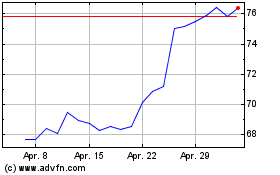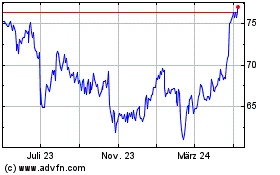Shares of Oxford-AstraZeneca Covid-19 Vaccine Startup Trade Down in Debut
30 April 2021 - 10:44PM
Dow Jones News
By Matt Grossman
Vaccitech PLC, a British company that co-invented the
AstraZeneca PLC Covid-19 vaccine, closed its first day of trading
with shares down 17%.
American depositary shares of the company, an offshoot of
University of Oxford research efforts, closed Friday at $14.10,
compared with their initial public offering price of $17 a
share.
Vaccitech came to prominence over the past year because of its
Covid-19 vaccine work. Its vaccine, marketed by AstraZeneca, has
been one of a handful of shots invented at blistering speed to
combat the pandemic, relative to the typically plodding pace of
pharmaceutical development.
More recently, however, the vaccine has experienced a rocky
world-wide rollout amid safety concerns and production
challenges.
Vaccitech was co-founded five years ago by two University of
Oxford professors, Adrian Hill and Sarah Gilbert. Its technology
focuses on priming the body's immune system to fight disease.
The company's approach, which uses an adenovirus vector encoded
with the target antigen, can be used in vaccines to prevent
diseases caused by infections, such as Covid-19. It can also
harness the immune system to treat illnesses such as cancer,
Vaccitech said.
In addition to its work on Covid-19, the company is developing a
vaccine for shingles and a treatment for prostate cancer, among
other therapeutic and prophylactic projects.
In 2020, Vaccitech's revenue was $4.8 million. The company spent
$14.4 million on research and development, and it recorded a net
loss attributable to shareholders of $17.7 million. In a regulatory
filing, Vaccitech said it expects to continue incurring significant
losses for the foreseeable future, citing development expenses.
In the IPO, Vaccitech issued 6.5 million shares, raising total
gross proceeds of $110.5 million. The shares are trading on the
Nasdaq Global Market under ticker symbol "VACC."
Some investors went into the listing with concerns about the
bumpy path of the Oxford-AstraZeneca vaccine, and in particular
blood clots that have affected a small number of people
postvaccination, investors said. The vaccine has yet to be approved
in the U.S., where in March AstraZeneca found itself in a spat with
regulators over the precise way it had stated the vaccine's
efficacy statistics.
The European Union, meanwhile, is suing AstraZeneca, saying that
the company hasn't delivered nearly as many doses as it had
promised.
An even bigger factor that weighed on Vaccitech was the recent
downdraft in biotechnology valuations broadly, investors said.
Vaccitech Chief Executive Bill Enright said Friday in an
interview that the prospects for clinical-stage treatments for
prostate cancer, hepatitis B and human papillomavirus were the
biggest focus of investor interest. He said the company is
monitoring the blood-clotting issues for any potential impact on
other Vaccitech projects using the same technology.
"I think people recognize that the safety events we've seen are
very rare and don't see a significant impact on our existing
portfolio," Mr. Enright said.
Jenny Strasburg contributed to this article.
Write to Matt Grossman at matt.grossman@wsj.com
(END) Dow Jones Newswires
April 30, 2021 16:29 ET (20:29 GMT)
Copyright (c) 2021 Dow Jones & Company, Inc.
AstraZeneca (NASDAQ:AZN)
Historical Stock Chart
Von Jun 2024 bis Jul 2024

AstraZeneca (NASDAQ:AZN)
Historical Stock Chart
Von Jul 2023 bis Jul 2024
